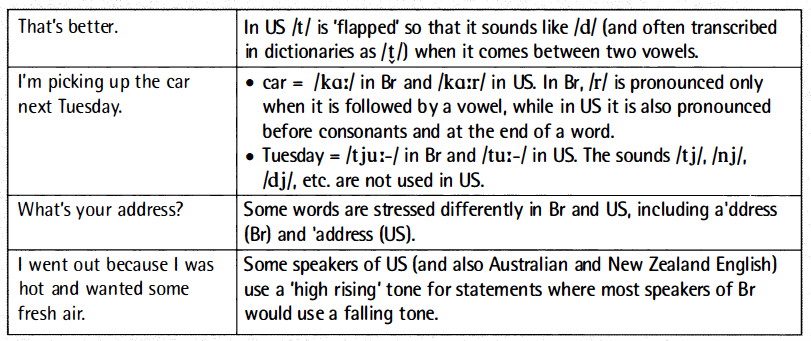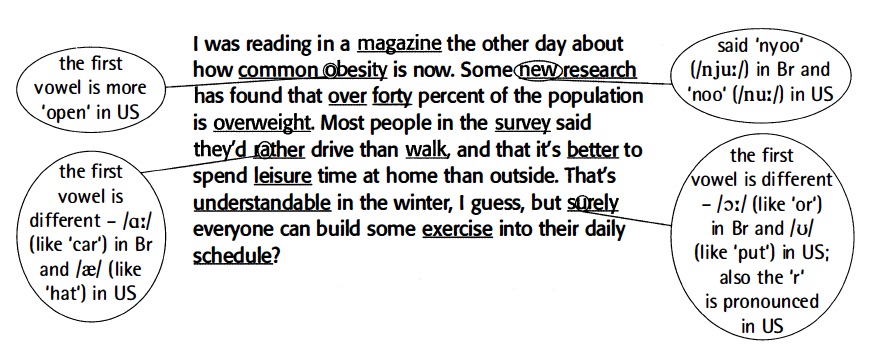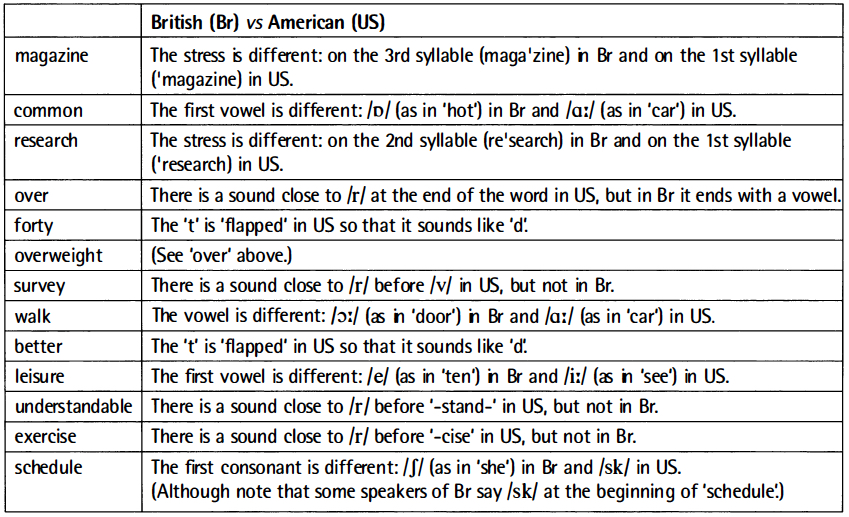Accents: Varieties of English
Although we commonly talk about ‘English pronunciation’, obviously not all speakers of English pronounce it in the same way. Even between countries where English is the first language of the majority of the population there are considerable differences, and we can distinguish between the pronunciation of ‘British English’, ‘American English’, ‘Australian English’, ‘South African English’, and so on.
Across these varieties of English, there may be differences in how vowels and consonants are pronounced,how words are stressed, and in intonation. For example, listen and notice differences between standard British English (Br) and American English (US) pronunciation in these sentences (you will hear British English first):
audio 1
Within Britain and the US there are also many regional accents. For example, listen and notice important differences in pronunciation in these sentences, said first by a speaker of ‘BBC English’ and then by a speaker from the city of Birmingham in England (you will hear BBC English first):
audio 2

audio 3
Here is a text read aloud first by a British English speaker and then an American English speaker. Listen as many times as you need and note differences in pronunciation that you observe, focusing on the underlined words. A few are done for you.
audio 4
You will hear four more people talking about what they enjoy doing in their spare time. They are from northern England, Scotland , Wales and Northern Ireland.
script audio 3
Speaker 1
I don’t get a lot of time to myself these days, but if I have a couple of hours to spare then I go down to the tennis club. I’ve just joined a tennis club near me and we’ve moved to a new house and er the tennis courts are right outside the back of my garden, so I just literally walk down and go through the gate and spend a couple of hours knocking balls about.
Speaker 2 (United States )
When I’ve got some free time urn I like to read. Usually I avoid the latest fiction and look for novels or novelists that I’ve always known about and wanted to read. But occasionally I just stroll through a bookshop and sometimes it’s just the cover of a book that makes me grab it and take it home.
Speaker 3 (Canada)
When I’ve got spare time I like to go to the lake. It’s about a twenty minute drive and when I get there I go water skiing. I just love water skiing when the weather’s good. And afterward if I’ve got enough energy, I pick Saskatoon berries on the lane behind the cabin. And later on in the week I make some pies.
Speaker 4 (Australia)
My favourite thing to do on a sunny day is to go to the beach. It takes about an hour from my house. I have to get the train and a bus, but it’s worth it. Lots of my friends live near the beach, so it’s always the perfect way to catch up and enjoy the sunshine.
Speaker 5 (South Africa)
One of my favourite things to do when I’ve got a bit of spare time is to go fishing with my friends. Er we get a bit of tackle together, the fishing rods, pile it all into the back of a four-by-four and we head up into the mountains. There’s some wonderful streams up there, well stocked with trout, and carp, and bream. We normally take a bit of a picnic up, you know, some bread rolls, and some ham and cheese, and it’s just a nice day out.
audio 4
script audio 4
audio 5
You will hear four more people talking about what they enjoy doing in their spare time. They are from northern England , Scotland , Wales and Northern Ireland .
script audio 5
1 (northern England)
When I get a day off, I like to go up into the Yorkshire Dales. These are sort of hills, er about twenty miles from where I live. And I’ll er walk through the day. I’ll set off while it’s still dark and walk for about eight hours. And at the end of that finish up in a village somewhere and have a nice meal.
Here are some of the differences you may have noticed between this accent and BBC English:
– the vowel in ‘I’, ‘like’, ‘nice’ (/aɪ/ in BBC English) is more ‘open’, beginning with a
sound close to /ɑː/ (as in ‘car’ )
– the vowel in ‘walk’ (/ɔː/ in BBC English) is said almost as two vowels /ɔː/ + /ə/
– the ‘r’ sound in ‘for about’ is said with a slight tap of the tongue behind the top teeth
2 (Scotland)
I live in the country and I’m I’m quite lucky because where I live is sort of on the top of um a range of low, flat hills. So it’s quite windy. On good days, I like to take my children out and we go and fly kites. The children have got little kites, because obviously if it’s too windy and with a big kite it would be really too, too much for them, they couldn’t control it. Um but they they thoroughly enjoy being out just just in the fresh air.
Here are some of the differences you may have noticed between this accent and BBC English:
– ‘r’ is pronounced where it would not be in BBC English ( in ‘sort’, ‘for then’, ‘air’ ) and said with a flap of the tongue
– the vowel in ‘like’, ‘fly’, ‘kite’, ete. (/aɪ/ in BBC English) begins with a sound close to ‘ee’ (/i:/)
– the vowel in ‘low’, ‘so’, ‘go’ (/əʊ/ in BBC English) is pronounced more like a simple
vowel, close to /ɔː/
3 (Wales)
In my spare time I really like visiting gardens. Usually, the gardens of big houses. And at every time of the year there’s something different to see. The spring, of course, is the best time, when everything’s coming into bud, and then later in the summer into full flower. It’s really wonderful. And even when it’s raining, you can still get great pleasure visiting gardens.
Here are some of the differences you may have noticed between this accent and BBC English:
– the vowel in ‘year’ (/ɪe/ in BBC English) is pronounced with more rounded lips
– the vowel in ‘gardens’ (/ɑː/ in BBC English) is more ‘open’, beginning with a sound
close to /æ/ (as in ‘cat’ )
– the /r/ in ‘raining’ and ‘really’ is said with a flap of the tongue
4 (Northern Ireland)
Usually, ’cause em I’m working during the week er and sometimes on a Saturday as well the
only day off that I have would be a Sunday. Er and on Sunday we like to get up early, make a big breakfast and if the weather’s good er I take my kids for a long walk in the country. Em we go off er with our little fishing rods and sometimes er go down to the local stream and with a net and try and er catch a few tiddlers or something like that.
(Note: A tiddler is a very small fish.)
Here are some of the differences you may have noticed between this accent and BBC English:
– the vowel in ‘usually’ and ‘during’ (/u:/ in BBC English) is pronounced rather like the
vowel in ‘good’ (/ʊ/)
– the vowel in ‘off’ (/ɔ/ in BBC English) is pronounced with more rounded lips
– the vowel in ‘stream’ (/i:/ in BBC English) is pronounced almost as two vowels /i:/ + /ə/


